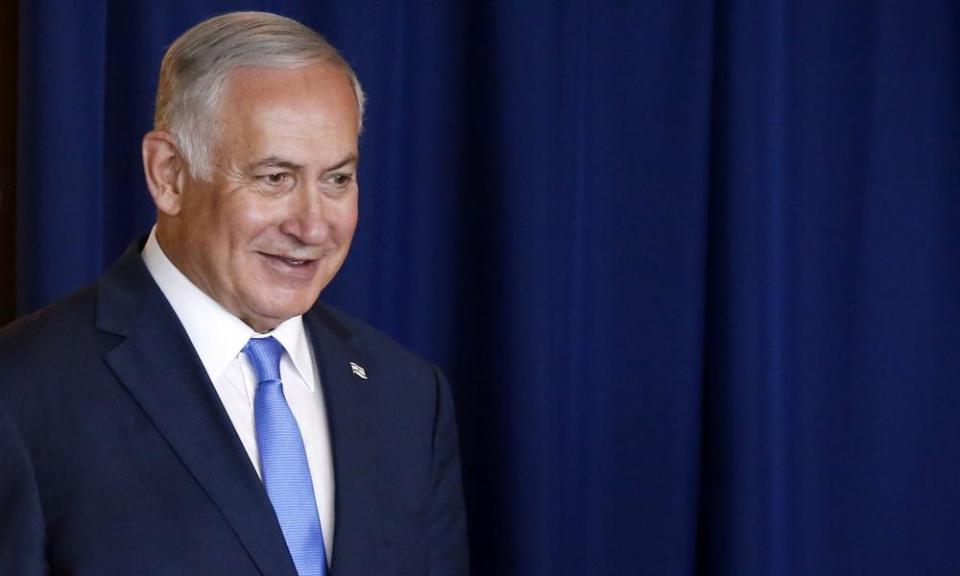Netanyahu claims Israel has found Iran's 'secret atomic warehouse'
Israel’s prime minister called for new sanctions against Iran, saying warehouse is storage for nuclear weapons programme

Benjamin Netanyahu has claimed that Israel had identified a “secret atomic warehouse” in Tehran, containing nuclear equipment and radioactive material.
Israel’s prime minister called for new sanctions against Iran and accused European leaders of “appeasement” for opposing them.
In a speech to the UN general assembly on Thursday, Netanyahu said he was revealing the existence of the “atomic warehouse” for the first time in public.
As he has in past presentations, Netanyahu brought visual aids to illustrate his claims.
He held up a satellite image which he said showed where the warehouse was located in Tehran, and a photograph of a nondescript wall and metal gate, which he said showed of the exterior of warehouse.
Netanyahu described the facility as a “secret atomic warehouse for storing massive amounts of equipment and materiel from Iran’s secret nuclear weapons programme”, but gave no further details, other than to allege that government officials had spread 15kg of the radioactive material around the streets of Tehran in an attempt to dispose of it. He said a nearby rug cleaning business should check its wares for radioactivity.
Tehran is party to a 2015 agreement curbing its nuclear activities in return for sanctions relief. As part of the Joint Comprehensive Programme of Action (JCPOA) it dismantled uranium-enriching centrifuges and a reactor and exported most of its stockpile of enriched uranium.
It is not clear, even if some surplus equipment was stored in a Tehran warehouse, whether it would represent a violation of the JCPOA. Dismantled centrifuges were to be stored in specified locations under international monitoring, but there not specific stipulations on the storing of other ancillary pieces of hardware.
Since 2015, the nuclear watchdog, the International Atomic Energy Agency (IAEA) has repeatedly certified that Iran is abiding by the terms of the JCPOA. But Netanyahu urged the IAEA director general, Yukiya Amano, to investigate the warehouse Israeli intelligence had identified.
“Do the right thing. Go and inspect this atomic warehouse immediately,” Netanyahu said.
Donald Trump broke ranks with his European allies in May by withdrawing the US from the agreement and calling for the sanctions to be reimposed on Iran. An effort by Trump to win support for his Iran policy on Wednesday however left him isolated as other council members voiced their support for the JCPOA as long as Iran continued to abide by the agreement.
Netanyahu lauded Trump and condemned European states, accusing them of appeasing Iran, and making clear he was deliberately drawing parallels with the Nazi era and the initial failure of the UK and France to stand up to Hitler’s Germany.
“I just used a strong word: appeasement,” Netanyahu said. “I use it reluctantly but unfortunately that is exactly what we are seeing again in Europe.”
“I’m a historian’s son,” the Israeli prime minister went on. “I have to ask: have whether these European leaders learned nothing from history? Will they ever wake up?”
In a similarly dramatic presentation in April, Netanyahu unveiled what Israel claimed was a nuclear archive that the country’s intelligence services claim they had seized and smuggled out of Tehran. Documents purported to have been part of the archive appear to have previously been seen by the IAEA, as early as 2005 and made public by the agency in 2011.
Asked about the possible significance of the “atomic warehouse” Jarrett Blanc, a former senior state department responsible for implementing the IAEA, said: “I’m sceptical just because this would be a strange and ineffective way to release this information. But if the Iranians are found to be in violation, it would be a different story.”
“For the Iranian government … Netanyahu’s speech is merely pageantry,” said Holly Dagres, nonresident fellow at the Atlantic Council and editor of the council’s IranSource blog. “Unfortunately for Netanyahu, his annual general assembly speech fell flat in the United States, his primary audience after Israel, since the speech took place during the Kavanaugh hearing. Tehran will likely see this as somewhat of a blessing.”

